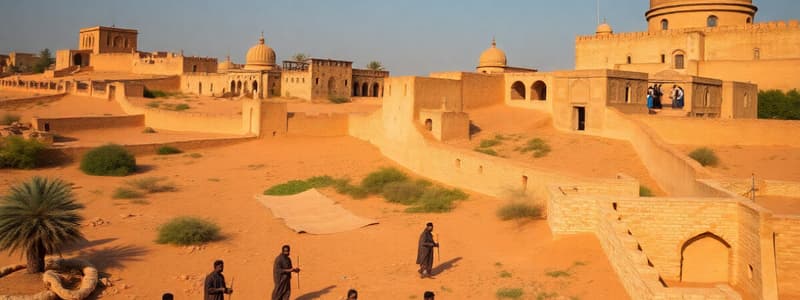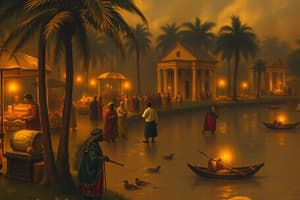Podcast
Questions and Answers
What was a significant feature of Sufi Islam?
What was a significant feature of Sufi Islam?
- Strict adherence to religious rules
- Focus exclusively on community rituals
- Emphasis on personal connection with Allah (correct)
- Rejection of Islamic teachings for individualism
What role did the Kingdom of Axum play in ancient trade?
What role did the Kingdom of Axum play in ancient trade?
- It primarily traded agricultural products within Africa.
- It was isolated from other trading regions.
- It was a crucial link connecting Europe, Africa, and the Middle East. (correct)
- It served as a minor trade center focused solely on Africa.
Which factor significantly contributed to the wealth of the Swahili City States?
Which factor significantly contributed to the wealth of the Swahili City States?
- Agriculture was their main economic activity.
- They engaged in limited local trading.
- They were strategically located along Indian Ocean trade routes. (correct)
- They focused primarily on gold mining.
What characterizes the trade relationships in North Africa?
What characterizes the trade relationships in North Africa?
How did Great Zimbabwe's technological innovations impact its society?
How did Great Zimbabwe's technological innovations impact its society?
What was a significant effect of the Islamization in East Africa?
What was a significant effect of the Islamization in East Africa?
Which civilization is known for its network of independent city-states ruled by merchant families?
Which civilization is known for its network of independent city-states ruled by merchant families?
Which statement about the Kingdom of Axum is correct?
Which statement about the Kingdom of Axum is correct?
What aspect of the Bantu migration is highlighted in the context of Great Zimbabwe?
What aspect of the Bantu migration is highlighted in the context of Great Zimbabwe?
Which characteristic best describes the governance of the Kongo Kingdom?
Which characteristic best describes the governance of the Kongo Kingdom?
What was a key feature of the Shona religion?
What was a key feature of the Shona religion?
How did Sundiata, the founding ruler of Mali, utilize Islam?
How did Sundiata, the founding ruler of Mali, utilize Islam?
What role did women play in gender dynamics within African societies?
What role did women play in gender dynamics within African societies?
Which of the following depicts the educational contributions of Mansa Musa?
Which of the following depicts the educational contributions of Mansa Musa?
What aspect of the Songhai Empire's governance changed under Mansa Askiam Muhammad?
What aspect of the Songhai Empire's governance changed under Mansa Askiam Muhammad?
What is a defining feature of the city-states in West Africa?
What is a defining feature of the city-states in West Africa?
The primary trade of the Kongo Kingdom was with which types of goods?
The primary trade of the Kongo Kingdom was with which types of goods?
How did the process of Islamization vary between urban and rural areas in West Africa?
How did the process of Islamization vary between urban and rural areas in West Africa?
What was the significance of Ibn Battuta's observations on women in Africa?
What was the significance of Ibn Battuta's observations on women in Africa?
Flashcards
Maghreb
Maghreb
The region in North Africa that was historically part of the Islamic Caliphates and conquered by Berber tribes.
Berber Dynasties
Berber Dynasties
Successive dynasties in North Africa, such as the Almoravids and Almohads, who ruled over the Maghreb after the conquest by Berber tribes.
Sufi Islam
Sufi Islam
A mystical branch of Islam focusing on personal spirituality, ritualism, and a direct connection with Allah.
Trans-Saharan Trade
Trans-Saharan Trade
Signup and view all the flashcards
Kingdom of Axum (Ethiopia)
Kingdom of Axum (Ethiopia)
Signup and view all the flashcards
Zanj / Swahili City States
Zanj / Swahili City States
Signup and view all the flashcards
Swahili Language
Swahili Language
Signup and view all the flashcards
Great Zimbabwe
Great Zimbabwe
Signup and view all the flashcards
Bantu Migrations & Innovation
Bantu Migrations & Innovation
Signup and view all the flashcards
Indian Ocean Trade Networks
Indian Ocean Trade Networks
Signup and view all the flashcards
Hausa Kingdoms
Hausa Kingdoms
Signup and view all the flashcards
Islamization in Hausa Kingdoms
Islamization in Hausa Kingdoms
Signup and view all the flashcards
Benin Kingdom
Benin Kingdom
Signup and view all the flashcards
Oba
Oba
Signup and view all the flashcards
Syncretism in Mali
Syncretism in Mali
Signup and view all the flashcards
Mansa Musa's Impact on Mali
Mansa Musa's Impact on Mali
Signup and view all the flashcards
Songhai Empire
Songhai Empire
Signup and view all the flashcards
Kongo Kingdom
Kongo Kingdom
Signup and view all the flashcards
Gender Roles in Africa
Gender Roles in Africa
Signup and view all the flashcards
Griots/Griottes
Griots/Griottes
Signup and view all the flashcards
Study Notes
African Developments – 1.5
- North Africa (Maghreb): Originally part of Dar al-Islam, conquered by Berber tribes, ruled by successive Berber dynasties (Almoravid and Almohad) under Islamic rule.
- Sufi Islam emphasized personal connection with Allah—not rigid adherence to rules. Trans-Saharan trade connected North Africa to West Africa and the Mediterranean.
- Kingdom of Axum (Ethiopia): Founded in the 1st century CE, a major trading hub connecting Europe, Africa, and the Middle East. Christianity spread from the Roman Empire into Egypt and south. It was a powerful kingdom but declined with the rise of Dar al-Islam. Later became the Abyssinian Empire (12th-16th centuries), remaining Christian.
- East Africa (Zanj/Swahili City-States): A network of independent city-states, thriving due to Indian Ocean trade with South Asia and Dar al-Islam. Collected interior African goods (gold, ivory, iron, slaves). Mix of African, Arab, Persian, and Indian cultures. Swahili language blended Bantu and Arabic. Voluntary Islamization.
- Great Zimbabwe: Inland East African kingdom, founded by Bantu peoples, known for massive walled cities built without mortar, superior agriculture and iron-metallurgy techniques. Traded with Swahili city-states, linked to Indian Ocean trade routes (South Asia, SE Asia). Practiced Shona religion, a blend of monotheism and ancestor veneration.
- West Africa (Hausa Kingdoms): Seven independent city-states with specialized crafts (textiles, leatherworking, gold, salt). Traded across the Sahara with North Africa. Islamization was largely among elites, while rural areas retained traditional faiths.
- Benin Kingdom: Skillful brass, wood, and ivory workers, known for bas-relief sculptures. Highly involved in West African trade, later the slave trade. Polytheistic religion, with the Oba as a divine descendant.
- Mali: Founded by Sundiata, who used Islam to expand trade with North African/Arab merchants. Mixture of Islam and indigenous African religion (syncretism). Mansa Musa promoted the Islamic faith through the Hajj and the development of learning centers (Timbuktu).
- Songhai: Conquered Mali, established a centralized government with a bureaucracy. Mansa Askiam Muhammad fully converted to Islam, imposed Sharia, promoted Islamic learning. Rural communities maintained traditional beliefs.
- Central Africa (Kongo Kingdom): Bantu-speaking, highly centralized, ruled by a monarch (nkani) with a council. Focused on regional trade (copper, ivory, slaves—along the Congo River).
- Kongo and Portuguese interaction: Increased wealth due to Portuguese traders in the 15th century. Elite conversion to Christianity due to European contact. Rural communities maintained traditional practices.
- Gender Roles:
- Rigid roles throughout Africa (though African women had more freedom than in Dar al-Islam).
- Men dominated government and commerce.
- Women focused on agriculture, weaving, and domestic tasks. Notable freedom of movement compared to other Islamic societies—no requirement for veils. Griots/Griottes (oral storytellers) were highly valued for their knowledge and power.
Studying That Suits You
Use AI to generate personalized quizzes and flashcards to suit your learning preferences.




